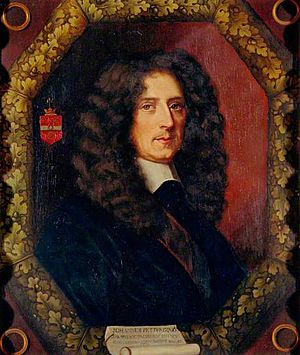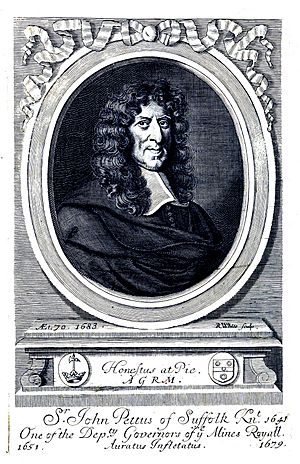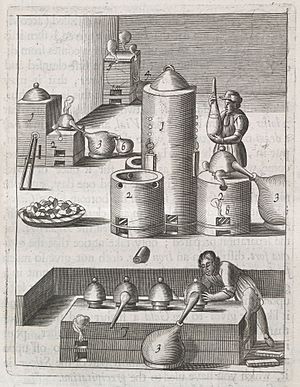John Pettus (courtier) facts for kids
Sir John Pettus (1613–1690) was an English royalist, politician, and natural philosopher. A royalist was someone who supported the king during the English Civil War. Pettus was an expert in mining and metals. He became a deputy governor of the royal mines in England and Wales. This was during the time of King Charles I and King Charles II. Pettus is also known for translating an important book about metals from German into English.
Sir John Pettus's Life
Sir John Pettus was born in 1613. He was the third son of Sir Augustine Pettus. He went to Pembroke College, Cambridge, in 1632. In 1639, he started working for King Charles I. He was knighted in 1641. This was a special honor from the king.
During the English Civil War, Sir John Pettus was captured by Oliver Cromwell's forces. He was held prisoner for 14 months. After being released, he formed his own group of soldiers to fight for the king. He also helped defend cities like Bath and Bristol.
After King Charles I was executed, Pettus continued to support the new King Charles II. He even sent money to the young king. He was briefly held for writing to King Charles II but was later set free. In 1655, he became a deputy governor of the royal mines.
In 1663, Pettus became a Fellow of the Royal Society. This is a famous group for scientists. He was also elected as a Member of Parliament for Dunwich in 1670. A Member of Parliament helps make laws for the country. In 1672, he became a deputy lieutenant for Suffolk. He also helped raise money for soldiers during the Third Anglo-Dutch War.
Sir John Pettus was once very wealthy. However, he later faced financial problems and was put in prison because of debt. He remained a deputy governor of the royal mines for over 35 years. He passed away in 1690.
Sir John Pettus's Books
Pettus wrote several books. Many of them were about mining and government.
- Fodinæ Regales: This book was about the history, laws, and locations of the main mines in England and Wales. It also covered the mint and money. He wrote this book at the request of Prince Rupert.
- England's Independency upon the Papal Power: This book was about England's independence from the Pope's power.
- Volatiles from the History of Adam and Eve: This book contained interesting ideas about nature.
- The Constitution of Parliaments in England: This book explained how parliaments worked in England. It looked at their history from King Edward II's time.
- Fleta Minor: This was a very important book. It was his translation of a German book by Lazarus Ercker. It explained how to test, refine, and work with metals.
He also had other books that were not finished or published. These included a book about his own life up to 1645.
Sir John Pettus's Family
Sir John Pettus married Elizabeth Gurney in 1639. They had two children:
- Richard, who died in 1662.
- Elizabeth, who married Samuel Sandys. She passed away in 1714.
 | Charles R. Drew |
 | Benjamin Banneker |
 | Jane C. Wright |
 | Roger Arliner Young |




